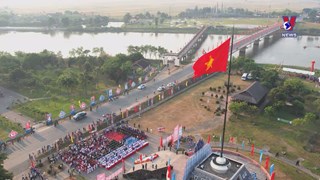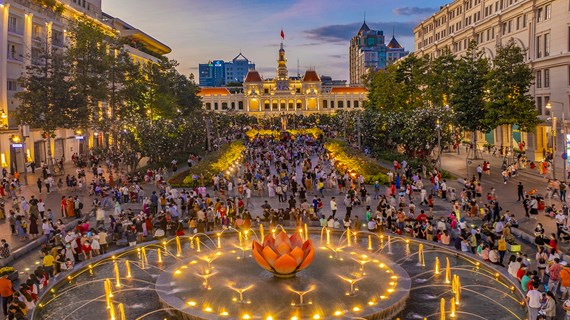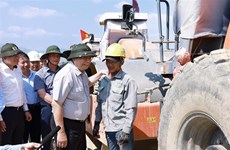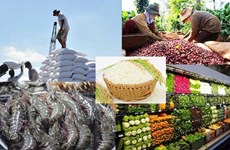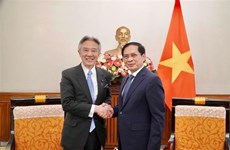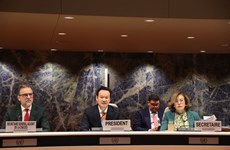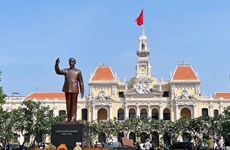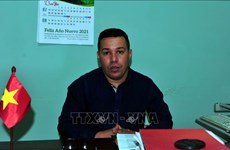📝 OP-ED: Press, Internet freedom ensured in Vietnam: Official
Deputy Director of the Ministry of Information and Communications (MIC)’s Authority of Foreign Information Service Dinh Tien Dung said in Vietnam, all citizens are free to share information, give comments and express their own opinions through the Internet, especially social networks.

The aspiration for a prosperous, self-reliant and self-resilient Vietnam has served as an intrinsic strength driving the country forward in its industrialisation and modernisation, during which the Party and State have adopted sound policies and guidelines to ensure human rights in general, and the rights to freedom of speech as well as press and Internet freedom for each citizen.
Deputy Director of the Ministry of Information and Communications (MIC)’s Authority of Foreign Information Service Dinh Tien Dung said in Vietnam, all citizens are free to share information, give comments and express their own opinions through the Internet, especially social networks.
This vividly shows that the Party and State always respect and protect the development rights of every citizen, including the rights to freedom of information and Internet freedom, he noted.
 All citizens in Vietnam are free to share information, give comments and express their own opinions through the Internet, especially social networks. (Photo: VGP)
All citizens in Vietnam are free to share information, give comments and express their own opinions through the Internet, especially social networks. (Photo: VGP)The Internet has come to all aspects of life, from education, health care and transport, to e-Government building. As of 2020, Vietnam had provided digital television receivers to 1.9 million poor households.
The MIC’s statistics show that as of September 2022, Vietnam had approximately 70 million Internet users and nearly 76 million using social platforms, up nearly 10 million within one year (equivalent to 73.7% of the population).
With these impressive results, the country ranked 12th globally in terms of Internet users and 6th out of the 35 countries/territories in Asia. Vietnamese users spend an average of nearly seven hours per day engaging in Internet-related activities, with a daily Internet usage rate reaching 94%.
Ensuring right to freedom of speech
The Party and State have issued numerous policies and guidelines to ensure human rights, as well as the rights to freedom of speech, and press and Internet freedom of all citizens.
The rights to freedom of speech and press freedom are enshrined in Article 10 of the first Constitution (1946) of the Vietnamese State, and in subsequent Constitutions, and institutionalised in various legal documents in the country.
In order to ensure the serious and comprehensive realisation of the right to freedom of speech, relevant laws and regulations have concretised the Constitution and been perfected to ensure citizens' rights and facilitate their exercise based on legal grounds. The Press Law has prescribed the guarantee of freedom of speech and press freedom. The State is responsible for creating favourable conditions for citizens to exercise these rights in the press.
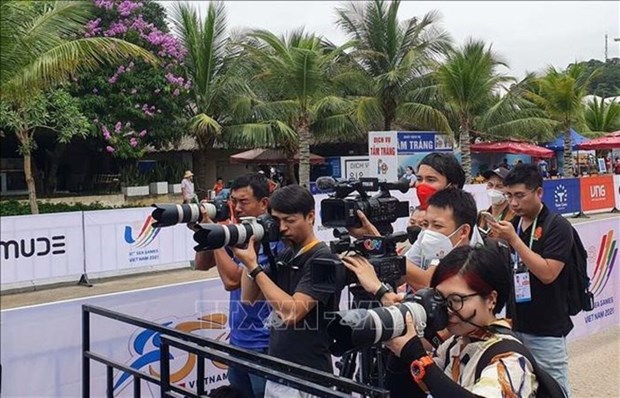 The press and journalists have operated within the legal framework, and been protected by the State. (Photo: VNA)
The press and journalists have operated within the legal framework, and been protected by the State. (Photo: VNA)However, Dung emphasised that in any country, all the rights to freedom of press, publishing, and information, are not absolute rights but those with limits. In Vietnam, the 2016 Press Law, the 2016 Law on Access to Information, and the 2018 Law on Cyber Security strictly prohibit any abuse of these rights in the press to infringe on the interests of the State, legitimate rights and interests of organisations and citizens; the dissemination of distorted, defamatory, and derogatory information about authorities; fabrications stirring public panic; distortion of the history; the denial of revolutionary achievements; insults to national heroes; and the spread of false information, slander, and defamation to agencies, organisations, and individuals.
Perfecting legal documents, policies
The MIC on June 17, 2021, issued Decision No. 874/QD-BTTTT promulgating the codes of conduct on social networks, under which organisations and individuals participating in social networks must show appropriate behaviour.
Legal documents and policies on the management of the press and online information are being developed and consolidated by the MIC and other relevant ministries and sectors. The MIC has quickly and drastically put in place the National Press Development and Management Plan until 2025, targeting a healthy press circle.
At the same time, the ministry has issued many projects and codes of conduct to ensure information security, protect personal data, and safeguard children's rights online, strengthened information management and prevented the spread of harmful information on the Internet. It has carried out inspections and penalties for violations by press agencies and publishers, strictly handled cases of false information spread through social networks, and required press management authorities to enhance their responsibilities.
The ministry has also coordinated with the Ministry of Public Security to investigate and handle the acts of abusing the right to freedom of speech, and infringing on the interests of the State, and legitimate rights and interests of organisations and citizens. It provided consultations for the Government in issuing Decision No. 1079/QD-TTg approving the communications project on human rights in Vietnam for 2023 - 2028, outlining five specific objectives, six groups of solutions, and 51 tasks for centrally-run agencies and localities.
The project also highlights the improvement of responsibility, awareness, and skills for human rights workforces at State agencies, the establishment and operation of human rights communication database, and technological application in building products. It also serves to enable storing and disseminating human rights communication data, and limiting false information and harmful contents about human rights in Vietnam.
Dung affirmed that ensuring the right to press and Internet freedom has always been a consistent viewpoint of the Vietnamese Party and State. However, those who abuse social networks to negatively influence cultural traditions, ethics, and lifestyles of the people, as well as the country’s achievements in socio-economic development, security and political situation, must be strictly handled./.
